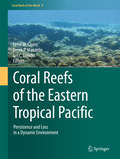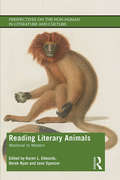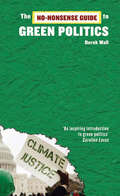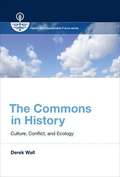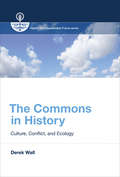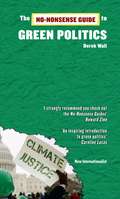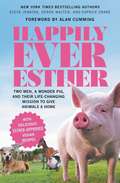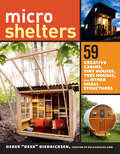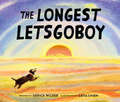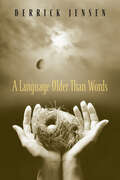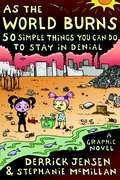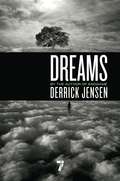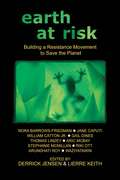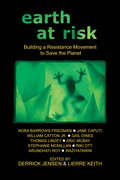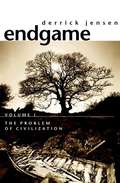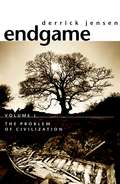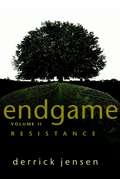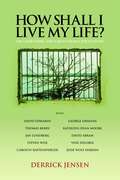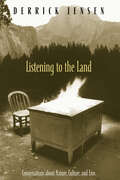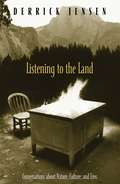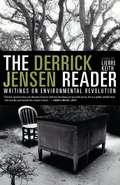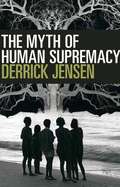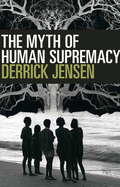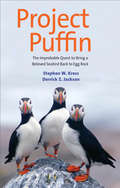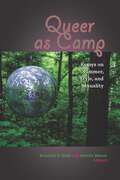- Table View
- List View
Coral Reefs of the Eastern Tropical Pacific: Persistence and Loss in a Dynamic Environment (Coral Reefs of the World #8)
by Peter W. Glynn Derek P. Manzello Ian C. EnochsThis book documents and examines the state of health of coral reefs in the eastern tropical Pacific region. It touches on the occurrence of coral reefs in the waters of surrounding countries, and it explores their biogeography, biodiversity and condition relative to the El Niño southern oscillation and human impacts. Additionally contained within is a field that presents information on many of the species presented in the preceding chapters.
Reading Literary Animals: Medieval to Modern (Perspectives on the Non-Human in Literature and Culture)
by Jane Spencer Derek Ryan Karen EdwardsReading Literary Animals explores the status and representation of animals in literature from the Middle Ages to the present day. Essays by leading scholars in the field examine various figurative, agential, imaginative, ethical, and affective aspects of literary encounters with animality, showing how practices of close reading provoke new ways of thinking about animals and the texts in which they appear. Through investigations of works by Shakespeare, Aphra Behn, William Wordsworth, Charles Dickens, Virginia Woolf, and Ted Hughes, among many others, Reading Literary Animals demonstrates the value of distinctively literary animal studies.
No-Nonsense Guide to Green Politics (No-Nonsense Guides #13)
by Derek WallClimate chaos and pollution, deforestation and consumerism: the crisis facing human civilization is clear enough. But the response of politicians has been cowardly and inadequate, while environmental activists have tended to favour single-issue campaigns rather than electoral politics. The No-Nonsense Guide to Green Politics measures the rising tide of eco-activism and awareness and explains why this event heralds a new political era worldwide: in the near futurethere will be no other politics but green politics.
The Commons in History
by Derek WallAn argument that the commons is neither tragedy nor paradise but can be a way to understand environmental sustainability.
The Commons in History: Culture, Conflict, and Ecology (History for a Sustainable Future)
by Derek WallAn argument that the commons is neither tragedy nor paradise but can be a way to understand environmental sustainability.The history of the commons—jointly owned land or other resources such as fisheries or forests set aside for public use—provides a useful context for current debates over sustainability and how we can act as “good ancestors.” In this book, Derek Wall considers the commons from antiquity to the present day, as an idea, an ecological space, an economic abstraction, and a management practice. He argues that the commons should be viewed neither as a “tragedy” of mismanagement (as the biologist Garrett Hardin wrote in 1968) nor as a panacea for solving environmental problems. Instead, Walls sees the commons as a particular form of property ownership, arguing that property rights are essential to understanding sustainability. How we use the land and its resources offers insights into how we value the environment.After defining the commons and describing the arguments of Hardin's influential article and Elinor Ostrom's more recent work on the commons, Wall offers historical case studies from the United States, England, India, and Mongolia. He examines the power of cultural norms to maintain the commons; political conflicts over the commons; and how commons have protected, or failed to protect ecosystems. Combining intellectual and material histories with an eye on contemporary debates, Wall offers an applied history that will interest academics, activists, and policy makers.
The No-Nonsense Guide to Green Politics
by Derek WallClimate chaos and pollution, deforestation and consumerism: the crisis facing human civilization is clear enough. But the response of politicians to it has been cowardly and inadequate, while environmental activists have tended to favor single-issue campaigns rather than electoral politics.The No-Nonsense Guide to Green Politics measures the rising tide of eco-activism and awareness and explains why it heralds a new political era worldwide.Derek Wall is a former principal speaker of the British Green Party. He is the author of numerous books, including Babylon and Beyond: The Economics of Anti-Capitalist, Anti-Globalist and Radical Green Movements.
Happily Ever Esther: Two Men, a Wonder Pig, and Their Life-Changing Mission to Give Animals a Home
by Steve Jenkins Derek WalterSteve Jenkins and Derek Walter, had their lives turned upside down when they adopted their pig-daughter Esther--the so-called micro pig who turned out to be a full-sized commercial pig growing to a whopping 600 pounds--as they describe in their bestselling memoir Esther the Wonder Pig. The book ends with them moving to a new farm, and starting a new wonderful life where they will live on the Happily Ever Esther Farm Sanctuary to care for other animals and just live happily ever after... Or so they thought. People often think about giving it all up and just moving to a farm. In theory it sure does sound great. But as Derek and Steve quickly realized, the realities of being a farmer--especially when you have never lived on a farm let alone outside of the city--can be frantic, crazy, and even insane. Not only are they adjusting to farm life and dutifully taking care of their pig-daughter Esther (who by the way lives in the master bedroom of their house), but before they knew it their sanctuary grew to as many as 42 animals, including: pigs, sheep, goats, rabbits, chickens, cows, roosters, a peacock, a duck, a horse, a donkey, and a barn cat named Willma Ferrell. Written with joy and humor, and filled with delicious Esther-approved recipes dispersed throughout the book, this charming memoir captures an emotional journey of one little family advocating for animals everywhere.
Microshelters: 59 Creative Cabins, Tiny Houses, Tree Houses, and Other Small Structures
by Derek “Deek” DiedricksenIf you dream of living in a tiny house, or creating a getaway in the backwoods or your backyard, you’ll love this gorgeous collection of creative and inspiring ideas for tiny houses, cabins, forts, studios, and other microshelters. Created by a wide array of builders and designers around the United States and beyond, these 59 unique and innovative structures show you the limits of what is possible. Each is displayed in full-color photographs accompanied by commentary by the author. In addition, Diedricksen includes six sets of building plans by leading designers to help you get started on a microshelter of your own. You’ll also find guidelines on building with recycled and salvaged materials, plus techniques for making your small space comfortable and easy to inhabit.
The Longest Letsgoboy
by Derick WilderHomeward Bound: The Incredible Journey meets Dog Heaven in this profoundly beautiful book about the special relationship between kids and dogs, the importance of language, and finding the meaning of life even in its final days.Poignant, hopeful, and lovingly told, this dog's journey—told by the dog himself in his own unique words—proves that love abides beyond a lifetime, out of sight but never far away.As a dog and his little girl go on their final walk together, he experiences the sights, smells, and wonders of this world one last time before peacefully passing on. But for such a good boy (oh yes, he is!) and his foreverfriend, that doesn't mean it's the end.Offering a unique and noteworthy take on death, this book balances the somber topic with a dog's ever-optimistic viewpoint, all woven together with its unconventional yet fitting approach to language.Family members, librarians, art-lovers, and educators alike will use this book as an accessible and comforting introduction to the ever-difficult topic of death, discussed and related in a new way with hopeful, uplifting, innovative language.THE PERFECT BOOK TO TALK ABOUT LOSS: The perennial themes of grief, fear, and death are always relevant and classic discussion topics even in families not yet dealing with death. The perfect answer to kids' big questions about what happens when we die, this book will be a standard in every home library.CREATIVE USE OF LANGUAGE: The words in this book are incredibly special, with phrases that conjure how the dog sees the world. The enjoyable challenge of matching up "letsgoboy" to a walk or "pufftails" to rabbits will make for meaningful discussions on a parent's lap or in a classroom reading circle.TEACHES CHILDREN EMPATHY: Reading this story from the dog's perspective is the perfect way for young readers to understand that the way another character thinks and perceives the world is different from their own experience.A BEAUTIFUL DOG STORY: Ideal for readers who love dogs, want dogs, or are going through a grieving process for their family dog, this book celebrates all that is most magical about these animals who are always by our side.A COMFORTING MESSAGE: It's rare for a book about death to extend beyond the moment of dying. The continuation of the dog's story past this point makes it special and especially comforting.Perfect for: parents and caregivers, dog lovers, educators
A Language Older Than Words
by Derrick JensenAt once a beautifully poetic memoir and an exploration of the various ways we live in the world, A Language Older Than Words explains violence as a pathology that touches every aspect of our lives and indeed affects all aspects of life on Earth. This chronicle of a young man's drive to transcend domestic abuse offers a challenging look at our worldwide sense of community and how we can make things better.
As the World Burns: 50 Simple Things You Can Do to Stay in Denial
by Derrick Jensen Stephanie McmillanTwo of America's most talented activists team up to deliver a bold and hilarious satire of modern environmental policy in this fully illustrated graphic novel. The U.S. government gives robot machines from space permission to eat the earth in exchange for bricks of gold. A one-eyed bunny rescues his friends from a corporate animal-testing laboratory. And two little girls figure out the secret to saving the world from both of its enemies (and it isn't by using energy-efficient light bulbs or biodiesel fuel). As the World Burns will inspire you to do whatever it takes to stop ecocide before it's too late. <P><P> <i>Advisory: Bookshare has learned that this book offers only partial accessibility. We have kept it in the collection because it is useful for some of our members. Benetech is actively working on projects to improve accessibility issues such as these.</i>
Dreams
by Derrick JensenJensen's furthest-reaching book yet, Dreams challenges the "destructive nihilism" of writers like Richard Dawkins and Sam Harris who believe that there is no reality outside what can be measured using the tools of science. He introduces the mythologies of ancient cultures and modern indigenous peoples as evidence of alternative ways of understanding reality, informed by thinkers such as American Indian writer Jack Forbes, theologian and American Indian rights activist Vine Deloria, Shaman Martin Prechtel, Dakota activist and scholar Waziyatawin, and Okanagan Indian writer Jeannette Armstrong. He draws on the wisdom of Dr. Paul Staments, author of Mycelium Running: How Mushrooms Can Help Save the World, sociologist Stanley Aronowitz, who discusses science's lack of accountability to the earth, and many more. As in his other books, Jensen draws heavily from his own life experience living alongside the frogs, redwoods, snails, birds and bears of the upper northwest, about which he writes with exquisite tenderness.Having taken on the daunting task of understanding one's dreams as a source of knowledge, Jensen achieves the near-impossible in this breathtakingly brave and ambitious new work.
Earth At Risk: Building A Resistance Movement To Save The Planet
by Derrick Jensen Lierre KeithThe annual conference Earth at Risk: Building a Resistance Movement to Save the Planet features environmental thinkers and activists who are willing to ask the hardest questions about the seriousness of the planet's situation, and this book presents an impassioned critique of the dominant culture from every angle. Speakers from the conference are featured in this volume and include William Catton, who explains ecological overshoot; Thomas Linzey, who gives a fiery call for community sovereignty; Jane Caputi, who exposes patriarchy's mythic dismemberment of the goddess; Aric McBay, who discusses historically effective resistance strategies; and Stephanie McMillan, who takes down capitalism. One by one, they build an unassailable case that the rich should be deprived of their ability to steal from the poor and the powerful of their ability to destroy the planet. These speakers offer their ideas on what can be done to build a real resistance movement: one that includes all levels of direct action that can actually match the scale of the problem. Also included are the speakers Derrick Jensen, Arundhati Roy, Rikki Ott, Gail Dines, Waziyatawin, Lierre Keith, and Nora Barrows-Friedman.
Earth at Risk: Building a Resistance Movement to Save the Planet (Flashpoint Press)
by Derrick JensenThe annual conference Earth at Risk: Building a Resistance Movement to Save the Planet features environmental thinkers and activists who are willing to ask the hardest questions about the seriousness of the planet's situation, and this book presents an impassioned critique of the dominant culture from every angle. Speakers from the conference are featured in this volume and include William Catton, who explains ecological overshoot; Thomas Linzey, who gives a fiery call for community sovereignty; Jane Caputi, who exposes patriarchy's mythic dismemberment of the goddess; Aric McBay, who discusses historically effective resistance strategies; and Stephanie McMillan, who takes down capitalism. One by one, they build an unassailable case that the rich should be deprived of their ability to steal from the poor and the powerful of their ability to destroy the planet. These speakers offer their ideas on what can be done to build a real resistance movement: one that includes all levels of direct action that can actually match the scale of the problem. Also included are the speakers Derrick Jensen, Arundhati Roy, Rikki Ott, Gail Dines, Waziyatawin, Lierre Keith, and Nora Barrows-Friedman.
Endgame, Volume 1: The Problem of Civilization
by Derrick JensenEndgame, Volume 1 builds on a series of simple but increasingly provocative premises: for example, "The needs of the natural world are more important than the needs of any economic system" and "Love does not imply pacifism." A brilliant weaving together of piercing analysis and elegant prose, Endgame leads us to see that we can re-imagine our world. Derrick Jensen is the acclaimed author of A Language Older Than Words and The Culture of Make Believe, among many others. Author, teacher, activist, small farmer, and leading voice of uncompromising dissent, he regularly stirs auditoriums across the country with revolutionary spirit. Jensen holds a degree in creative writing from Eastern Washington University, a degree in mineral engineering physics from the Colorado School of Mines, and has taught at Eastern Washington University and Pelican Bay State Prison.
Endgame, Volume 1: The Problem of Civilization
by Derrick JensenThe long-awaited companion piece to Derrick Jensen's immensely popular and highly acclaimed works A Language Older Than Words and The Culture of Make Believe. Accepting the increasingly widespread belief that industrialized culture inevitably erodes the natural world, Endgame sets out to explore how this relationship impels us towards a revolutionary and as-yet undiscovered shift in strategy. Building on a series of simple but increasingly provocative premises, Jensen leaves us hoping for what may be inevitable: a return to agrarian communal life via the disintegration of civilization itself.
Endgame, Volume 2: Resistance
by Derrick JensenWhereas Volume 1 of Endgame presents the problem of civilization, Volume 2 of this pivotal work illustrates our means of resistance. Incensed and hopeful, impassioned and lucid, Endgame leapfrogs the environmental movement's deadlock over our willingness to change our conduct, focusing instead on our ability to adapt to the impending ecological revolution.
How Shall I Live My Life? On Liberating the Earth from Civilization
by Derrick JensenInterviews with Vine Deloria, Jesse Wolf Hardin, David Abram, Kathleen Dean Moore, Carolyn Raffensperger, George Draffan, Steven Wise, Jan Lundberg, Thomas Berry, David Edwards. In this collection of interviews, Derrick Jensen discusses the destructive dominant culture with ten people who have devoted their lives to undermining it. Whether it is Carolyn Raffensperger and her radical approach to public health, or Thomas Berry on perceiving the sacred; be it Kathleen Dean Moore reminding us that our bodies are made of mountains, rivers, and sunlight; or Vine Deloria asserting that our dreams tell us more about the world than science ever can, the activists and philosophers interviewed in How Shall I Live My Life? each bravely present a few of the endless forms that resistance can and must take. Hailed as the philosopher poet of the ecological movement, Derrick Jensen is the widely acclaimed author of Endgame, A Language Older Than Words, The Culture of Make Believe (a finalist for the 2003 J. Anthony Lukas Book Prize), and Walking on Water, among many others. Jensen's writing has been described as "breaking and mending the reader's heart" (Publishers Weekly). Author, teacher, activist, and leading voice of uncompromising dissent, he regularly stirs auditoriums across the country with revolutionary spirit. He lives in Crescent City, California.
Listening to the Land: Conversations about Nature, Culture and Eros
by Derrick JensenIn this far-ranging and heartening collection, Derrick Jensen gathers conversations with environmentalists, theologians, Native Americans, psychologists, and feminists, engaging some of our best minds in an exploration of more peaceful ways to live on Earth. Included here is Dave Foreman on biodiversity, Matthew Fox on Christianity and nature, Jerry Mander on technology, and Terry Tempest Williams on an erotic connection to the land. With intelligence and compassion, Listening to the Land moves from a look at the condition of the environment and the health of our spirit to a beautiful evocation of eros and a life based on love.
Listening to the Land: Conversations about Nature, Culture, and Eros
by Derrick JensenDeclaring American culture "the most destructive culture ever to exist," this work presents 29 interviews with a range of activists, theologians, psychologists, and other thinkers who trace a range of themes of related to the relationship between culture and environmental destruction. Among the figures interviewed are Earth First! cofounder Dave Foreman, historian of religion Thomas Berry, technology critic Jerry Mander, Chickasaw poet and novelist Linda Hogan, psychologist Robert Jay Lifton, Native American scholar and activist Ward Churchill, and feminist and peace activists Starhawk. Annotation ©2004 Book News, Inc., Portland, OR (booknews.com)
The Derrick Jensen Reader: Writings on Environmental Revolution
by Derrick Jensen Lierre KeithIn an age marked by seemingly unstoppable environmental collapse and the urgent quest for solutions, environmental philosopher Derrick Jensen, the voice of the growing deep ecology movement, reveals for us new seeds of hope. Here for the first time in The Derrick Jensen Reader are collected generous selections from his prescient, unflinching books on the problem of civilization and the path to true resistance.In the acclaimed A Language Older Than Words, Jensen dissects his own abusive childhood to examine the pathology of Western culture and shares with us the power and beauty of an alliance with the natural world. He continues to use the lens of his own experience as well as the wisdom of philosophers, activists, and teachers to expose oppression and call us to action in his other early works, Listening to the Land, A Culture of Make Believe, Strangely Like War, and Walking on Water. We see his analysis deepen when he asks us to accept that the only moral response to biocide is resistance in the two-volume Endgame, a truth he explores further in Thought to Exist in the Wild, What We Leave Behind, the graphic novel As The World Burns, and in his two novels, Songs of the Dead and Lives Less Valuable. And in Dreams, Jensen's latest work, he leads us still further toward his vision for a healed planet, freeing us to see beyond the limits of our present culture to a future luminous with meaning.
The Myth of Human Supremacy
by Derrick JensenIn this impassioned polemic, radical environmental philosopher Derrick Jensen debunks the belief in a hierarchy of nature and the superiority of humans. Vast and underappreciated complexities of nonhuman life are explored in detail; the paralysis of the scientific establishment on moral and ethical issues is confronted; and a radical new framework for assessing the intelligence and sentience of nonhuman life is put forth. A philosopher-poet of the environmental movement, Jensen sounds an urgent call for its liberation from human domination.
The Myth of Human Supremacy
by Derrick JensenIn this impassioned polemic, radical environmental philosopher Derrick Jensen debunks the near-universal belief in a hierarchy of nature and the superiority of humans. Vast and underappreciated complexities of nonhuman life are explored in detail--from the cultures of pigs and prairie dogs, to the creative use of tools by elephants and fish, to the acumen of caterpillars and fungi. The paralysis of the scientific establishment on moral and ethical issues is confronted and a radical new framework for assessing the intelligence and sentience of nonhuman life is put forth. Jensen attacks mainstream environmental journalism, which too often limits discussions to how ecological changes affect humans or the economy--with little or no regard for nonhuman life. With his signature compassionate logic, he argues that when we separate ourselves from the rest of nature, we in fact orient ourselves against nature, taking an unjust and, in the long run, impossible position.Jensen expresses profound disdain for the human industrial complex and its ecological excesses, contending that it is based on the systematic exploitation of the earth. Page by page, Jensen, who has been called the philosopher-poet of the environmental movement, demonstrates his deep appreciation of the natural world in all its intimacy, and sounds an urgent call for its liberation from human domination.From the Trade Paperback edition.
Project Puffin
by Derrick Z. Jackson Stephen W. KressDetails a wildlife scientist's successful efforts to restore puffin colonies in Maine through an experiment in habitat restoration.
Queer as Camp: Essays on Summer, Style, and Sexuality
by Kenneth B. Kidd Derritt MasonNamed the #1 Bestselling Non-Fiction Title by the Calgary HeraldTo camp means to occupy a place and/or time provisionally or under special circumstances. To camp can also mean to queer. And for many children and young adults, summer camp is a formative experience mixed with homosocial structure and homoerotic longing. In Queer as Camp, editors Kenneth B. Kidd and Derritt Mason curate a collection of essays and critical memoirs exploring the intersections of “queer” and “camp,” focusing especially on camp as an alternative and potentially nonnormative place and/or time. Exploring questions of identity, desire, and social formation, Queer as Camp delves into the diverse and queer-enabling dimensions of particular camp/sites, from traditional iterations of camp to camp-like ventures, literary and filmic texts about camp across a range of genres (fantasy, horror, realistic fiction, graphic novels), as well as the notorious appropriation of Indigenous life and the consequences of “playing Indian.” These accessible, engaging essays examine, variously, camp as a queer place and/or the experiences of queers at camp, including Vermont’s Indian Brook, a single-sex girls’ camp that has struggled with the inclusion of nonbinary and transgender campers and staff; the role of Jewish summer camp as a complicated site of sexuality, social bonding, and citizen-making as well as a potentially if not routinely queer-affirming place. They also attend to cinematic and literary representations of camp, such as the Eisner award-winning comic series Lumberjanes, which revitalizes and revises the century-old Girl Scout story; Disney’s Paul Bunyan, a short film that plays up male homosociality and cross-species bonding while inviting queer identification in the process; Sleepaway Camp, a horror film that exposes and deconstructs anxieties about the gendered body; and Wes Anderson’s critically acclaimed Moonrise Kingdom, which evokes dreams of escape, transformation, and other ways of being in the world. Highly interdisciplinary in scope, Queer as Camp reflects on camp and Camp with candor, insight, and often humor. Contributors: Kyle Eveleth, D. Gilson, Charlie Hailey, Ana M. Jimenez-Moreno, Kathryn R. Kent, Mark Lipton, Kerry Mallan, Chris McGee, Roderick McGillis, Tammy Mielke, Alexis Mitchell, Flavia Musinsky, Daniel Mallory Ortberg, Annebella Pollen, Andrew J. Trevarrow, Paul Venzo, Joshua Whitehead
